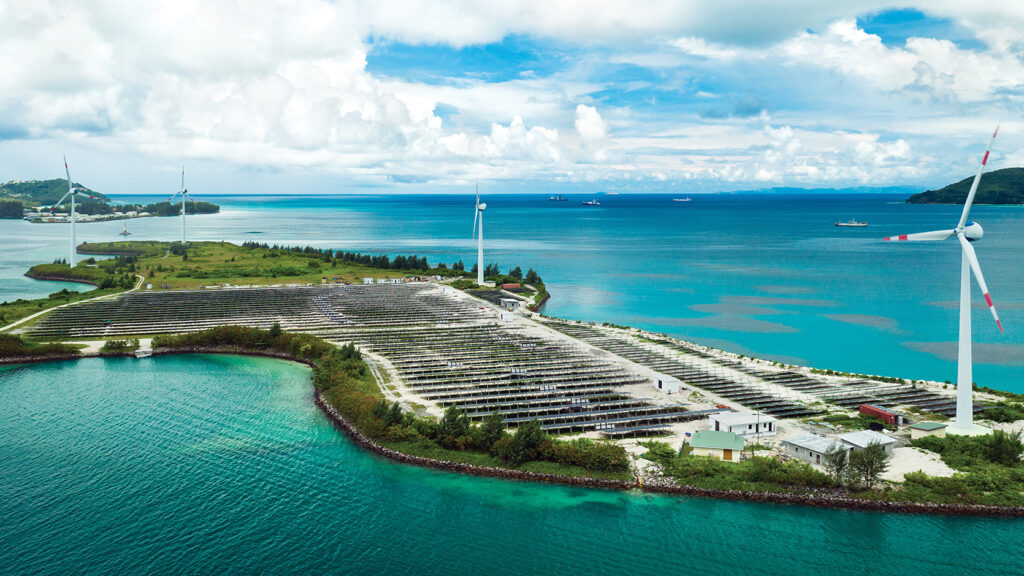Seychelles’ multi-pronged bid to attract investors

Seychelles is aiming to attract FDI through a combination of its good natural resources, sustainability-led strategies and investor-friendly government policies. Courtney Fingar reports.
As the global economy emerges from years of uncertainty, Seychelles is stepping into the spotlight, not just as a world-class tourism destination, but as a serious contender for foreign direct investment (FDI). With a bold, sustainability-led strategy, the island nation is leveraging its natural assets and forward-thinking policies to attract investors.
Anne Rosette, CEO of the Seychelles Investment Board (SIB), believes 2025 will mark a turning point. “Seychelles is positioning itself as an attractive destination for FDI through a combination of climate-focused strategies, tourism diversification, and real estate development,” she says.
Indeed, sustainability sits at the heart of Seychelles’ investment pitch. In partnership with the United Nations Development Programme, the government has launched the Seychelles SDG Investor Map, an intelligence tool identifying sectors and business models where private capital can align with national development goals while generating strong financial returns.
Seychelles’ ambitions for a green economy are more than aspirational. The country has committed to increasing its share of renewable energy from 5% to 15% by 2030, with a target of full decarbonisation by 2050. This creates clear investment avenues.
Solar farm projects
Among the standout opportunities are grid-connected rooftop solar systems and off-grid photovoltaic (PV) installations, particularly in remote outer islands. A floating solar farm project in Providence has already been awarded to an independent power producer. These ventures offer returns of 10-15% and payback periods of under a decade – a compelling proposition for green investors.
“Environmental sustainability is a key investment driver,” Rosette affirms. “This approach appeals to eco-conscious investors who are increasingly seeking meaningful, eco-friendly projects.”
Meanwhile, Seychelles’ iconic tourism sector is undergoing a transformation. Moving beyond the traditional sun, sea, and sand model, the government is incentivising eco-tourism, cultural tourism, and circular economy practices within the hospitality industry. New developments focus on minimising environmental impact while increasing community involvement, such as integrating ‘sea-to-table’ dining, heritage site restoration, and local sourcing.
“There’s a strong push to enhance visitor experiences through sustainability,” Rosette says. “The tourism department is also lifting the moratorium on converting residences into tourism accommodation on Mahé and Praslin to diversify the sector.”
One of Seychelles’ most compelling value propositions is its evolving real estate framework, which increasingly links property investment to long-term residency. For international investors, this opens a pathway to establishing a base in a politically stable, high-income island economy.
Refining residency
According to Rosette, “Seychelles is refining its residency programmes, with property investment opportunities tied to residency visas, offering foreign investors the chance to establish a long-term presence in the country. It’s a long-term partnership.”
Seychelles imports 70% of its food — a vulnerability that has been exposed during recent global disruptions. In response, the country is incentivising sustainable crop production, including distilleries for high-value crops like cinnamon, vanilla copra. Investors can tap into a growing market for cosmetics, health products, and gourmet exports, with gross margins exceeding 25% and payback periods under five years.
The nation is also eyeing sustainable aquaculture. “We see a lot of potential in fish farming,” Rosette notes. “It’s a strategic sector for food security and export diversification.”
Seychelles is also making notable strides in digital transformation. The government’s Digital Economy Agenda aims to turn the archipelago into a fintech hub, with growing demand for business software solutions, e-government services, and traceable supply chains.

One promising area is the creation of digital marketplaces for artisanal fishers, allowing direct transactions with hotels and consumers, while improving traceability and sustainability. These platforms align with international ESG investment standards and offer returns on investment above 25%.
‘Embracing technology is essential’
“Embracing technology is essential,” Rosette emphasises. “It streamlines processes, enhances investor engagement, and opens up new sectors like ICT and fintech.”
Of course, no opportunity comes without hurdles. Seychelles, like other small island states, faces stiff competition for investment, resource constraints and the ongoing need to innovate.
“The main challenges investment promotion agencies like SIB face are high competition and the need for tailored, innovative approaches,” Rosette explains. “But by focusing on our unique strengths – marine conservation, renewable energy, and sustainability – we can turn challenges into opportunities.”
Seychelles is meeting these challenges head-on by fostering strategic public-private partnerships, investing in human capital, and streamlining investor services. The result is a nimble, investor-friendly environment that supports both impact and profitability.
Strong governance indicators
Seychelles stands out in the Sub-Saharan Africa region due to its strong governance indicators, high human development rankings, and clear commitment to the Sustainable Development Goals (SDGs). It is the only country in the region to maintain a high-income status since 2015 and ranks first in Africa on the UN E-Government Development Index.
Additionally, Seychelles performs exceptionally well in the 2025 Financial Crime Risk Index, recently published by the Basel Institute on Governance, ranking as the top-performing African nation.
According to the latest Global Financial Crime Risk Ranking, Seychelles holds the 22nd position globally, surpassing many well-developed countries such as the UK, France, Japan, Poland, and the US. Within Africa, it leads as the country with the lowest financial crime risk, followed by Botswana, Mauritius, and Rwanda.
As a proud member of the Indian Ocean Commission (IOC), Seychelles serves as an exemplary model for fellow small island states. Despite its size, the nation continues to achieve remarkable progress, consistently earning top-tier positions in global indexes—including the Mo Ibrahim Index and Transparency International’s Corruption Perceptions Index.
Rosette sums it up by saying “the future for small states like ours is filled with potential. Through smart partnerships, digital innovation, and a clear focus on sustainability, Seychelles is ready to welcome the next wave of visionary investors.”
For more information visit www.investinseychelles.com/key-sectors/sdg-investor-map
